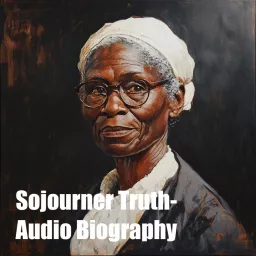Sojourner Truth - Audio Biography

Sojourner Truth, born Isabella Baumfree in 1797, was an African American abolitionist, women’s rights activist, and preacher whose remarkable life journey from enslavement to national prominence exemplifies resilience and dedication to justice. Her legacy endures as one of the most influential voices for equality in 19th-century America, advocating not only for the abolition of slavery but also for the advancement of women’s rights and the power of faith and self-determination. Born into slavery in Ulster County, New York, on the estate of Colonel Johannes Hardenbergh, Truth’s early life was marked by instability and hardship. Her parents, James Baumfree and Elizabeth, were also enslaved and struggled to protect their children from the cruelties of the system. Isabella was sold multiple times during her youth, enduring separation from her family and the abuses of cruel masters. Her third owner, John Dumont, subjected her to particularly harsh treatment, shaping her early experiences with the injustice and dehumanization of slavery. Despite these circumstances, Isabella exhibited remarkable strength and spiritual conviction. She developed a deep connection to her Christian faith, which provided her with solace and a sense of purpose amidst adversity. By the time New York began its gradual abolition of slavery, Isabella recognized an opportunity to assert her freedom. In 1826, she escaped from Dumont’s household with her infant daughter, Sophia, seeking refuge with the Van Wagenen family, who offered her protection and support. Through their assistance, she secured her legal freedom and took her first steps toward a life of autonomy. Isabella’s newfound freedom was immediately tested when she discovered that her son, Peter, had been illegally sold to a plantation owner in Alabama. Demonstrating extraordinary courage and determination, she initiated legal proceedings to secure his release. In a landmark case, she became one of the first Black women to successfully sue a white man in the United States, reuniting her family and solidifying her belief in the possibility of justice through persistent advocacy. This experience not only empowered Isabella but also foreshadowed her lifelong commitment to fighting for the rights of the oppressed. In 1843, Isabella experienced a profound spiritual awakening that transformed her life and identity. Feeling divinely called to spread a message of hope, justice, and equality, she adopted the name Sojourner Truth, reflecting her mission to journey across the nation as a preacher and advocate. This new name symbolized her belief in the importance of speaking truth and embodying God’s will. Truth’s faith was deeply interwoven with her activism, providing the foundation for her powerful oratory and her unwavering commitment to social justice. Her journey led her to join the Northampton Association of Education and Industry, a utopian abolitionist community in Massachusetts. There, Truth worked alongside prominent reformers such as William Lloyd Garrison, Frederick Douglass, and David Ruggles. Immersed in this environment, she honed her speaking skills and began sharing her personal experiences to illuminate the horrors of slavery and the urgent need for emancipation. Truth’s ability to connect her own story with broader themes of justice and faith made her a compelling and sought-after speaker. As an abolitionist, Sojourner Truth traveled extensively, delivering impassioned speeches that combined biblical references with her firsthand accounts of slavery’s brutality. Her speeches often captivated audiences with their blend of moral clarity, humor, and profound insight. In 1851, at the Ohio Women’s Rights Convention, she delivered her most famous address, later known as “Ain’t I a Woman?” In this speech, she challenged prevailing notions of racial and gender inferiority, asserting her equality as a Black woman and calling for universal rights. While the exact words of her speech were not recorded verbatim, the impact of her message was profound. Truth’s ability to weave logic, emotion, and spirituality resonated deeply, making her a powerful voice in the intersecting movements for abolition and women’s suffrage. Her activism extended beyond public speaking. During the Civil War, Truth worked tirelessly to support Black troops, advocating for equal treatment and fair pay for African American soldiers. She helped recruit men to fight for the Union cause, believing that their service was integral to advancing the fight for freedom and equality. Her dedication to the war effort earned her respect from national leaders, including President Abraham Lincoln, whom she met in 1864. Truth presented Lincoln with a copy of her autobiography, “The Narrative of Sojourner Truth,” which she had dictated to her friend Olive Gilbert in 1850. The book provided a powerful account of her life and struggles, bringing her story to a wider audience and solidifying her place as a leading figure in American history. Following the war, Sojourner Truth turned her attention to the challenges faced by newly freed African Americans. She advocated for land redistribution as part of Reconstruction, arguing that economic independence was essential for true freedom. Though her campaign for land grants—often referred to as the “Exoduster” movement—did not achieve its goals, her efforts highlighted the systemic barriers to racial equality and the need for comprehensive reforms. Truth also continued her work for women’s rights, participating in suffrage conventions and advocating for the inclusion of Black women in the broader struggle for equality. In her later years, Truth remained active as a speaker and activist, using her platform to address social injustices and inspire change. Her eloquence and moral authority earned her the admiration of audiences across the country, as well as the enduring respect of her peers. She spent her final years in Battle Creek, Michigan, where she continued to advocate for justice and mentor younger activists. Sojourner Truth passed away on November 26, 1883, leaving behind a legacy that has inspired generations. Her life is a testament to the power of resilience, faith, and the courage to challenge injustice. From her early years as an enslaved woman to her rise as a nationally recognized advocate for human rights, Truth’s journey exemplifies the transformative power of determination and advocacy. Her contributions to the abolitionist and women’s rights movements remain a cornerstone of American history. Truth’s speeches, writings, and activism continue to resonate as a call to action for equality and justice. Her unwavering belief in the interconnectedness of faith and activism, and her ability to bridge the struggles for racial and gender equality, make her an enduring symbol of hope and perseverance. Through her life and work, Sojourner Truth reminds us that the fight for justice is both a personal and collective endeavor, one that requires courage, conviction, and an unshakable commitment to truth. This has been a Quiet Please production. Head over to Quiet Please dot A I to “Hear What Matters”








![[REDACTED] History [REDACTED] History](https://podcastaddict.com/cache/artwork/thumb/4093402)






















